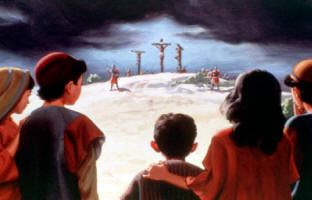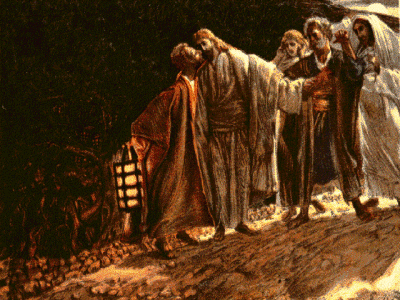
Were You There
When they Crucified my Lord?

The sufferings of Christ: His Trial; Crucifixion; and Resurrection. Taken from some rare booklets 1877

Just then a hoarse voice rang through the hall, which sent a thrill of terror through the hearts of all present: He is innocent. Spare him, O Caiaphas! He has done nothing worthy of death! The tall form of Judas was now seen pressing his way through the startled crowd. His face was pale and haggard, and large drops of perspiration stood upon his forehead. He rushed to the throne of judgment, and threw down before the high priest the pieces of silver he had received as the price of his Lord's betrayal. He eagerly grasped the robe of Caiaphas, and implored him to release Jesus, declaring that he was innocent of all crime. Caiaphas angrily shook him off, but he was confused and knew not what to say. The perfidy of the priests was revealed before the people. It was evident to all that Judas had been bribed to deliver Jesus into the hands of those who sought his life.
Judas continued to beseech Caiaphas to do nothing against Jesus, declaring that he was indeed the Son of God, and cursing himself that he had betrayed innocent blood. But the high priest, having recovered his self-possession, answered with chilling scorn, "What is that to us? see thou to that." He then represented to the people that Judas was some poor maniac, one of the mad followers of Jesus, and charged them not to let any influence prevail to release the prisoner, who was a base deceiver.
Finding his prayers were in vain, Judas fell at the feet of Jesus, acknowledging him to be the Son of God, begging forgiveness for his sin, and imploring him to exercise his God-like power and deliver himself from his enemies. The Saviour did not reproach his betrayer either by look or word. He knew that he was suffering the bitterest remorse for his crime. He gazed compassionately upon Judas, and declared that for that hour he had come into the world.
A murmur of surprise ran through the assembly at the heaven forbearance manifested by Jesus. Again a conviction swept over their minds that this man was more than mortal. But the question then arose, If he was indeed the Son of God, why did he not free himself from his bonds and rise triumphant above his accusers?
The love of money had perverted the nobler nature of Judas, making him a fit agent for Satan to use in the betrayal of Christ. When Judas had become annoyed at the implied rebuke of Jesus because of his covetous spirit upon the occasion of Mary anointing her Lord with costly ointment, he yielded to the tempter, and gave Satan easy access to his mind. But when he decided to sell his Master to the murderous priests and rulers, he had no thought that Jesus would permit himself to be taken. He thought the priests would be cheated of their bribe, and he, the betrayer, would secure the money to use for some purpose of his own, and Jesus would have a new opportunity to display his divine power in delivering himself from the wiles of his enemies.
From the time of his betrayal in the garden, Judas had not lost sight of the Saviour. He eagerly looked for him to surprise his enemies by appearing before them in the character of the Son of God, setting at naught all their plots and power. But when he saw him meekly submitting to their abuse, suffering himself to be tried and condemned to death, his heart smote him, and he realized the full extent of his own crime --he had sold his divine Master to shame and death. He remembered how kind and considerate Jesus had ever been to him, and his heart filled with remorse and anguish. He now despised the covetousness which Jesus had reproved, and which had tempted him to sell the Saviour for a few pieces of silver.
Perceiving that his entreaties to spare the life of Jesus availed nothing with the high priest, he rushed from the hall in despair, crying, It is too late! It is too late! He felt unable to live to see Jesus crucified, and, in an agony of remorse, went out and hanged himself.
Afterward the money which Judas had cast down before the priest was used for the purchase of a public burial ground. "And the chief priests took the silver pieces, and said, It is not lawful for to put them into the treasury, because it is the price of blood. And they took counsel, and bought with them the potter's field, to bury strangers in. Wherefore that field was called, The field of blood, unto this day."
If any testimony had been needed to prove the innocence of Jesus, it was given in the confession of Judas. Not only was it an evidence of the innocence of the Saviour, but the event was a direct fulfillment of prophecy. In prophetic vision Zechariah had looked down the ages and seen the trial of God's dear Son. The act of Judas is thus described: "And I said unto them, If ye think good, give me my price; and if not, forbear. So they weighed for my price thirty pieces of silver. And the Lord said unto me, Cast it unto the potter; a goodly price that I was prized at of them. And I took the thirty pieces of silver, and cast them to the potter in the house of the Lord."